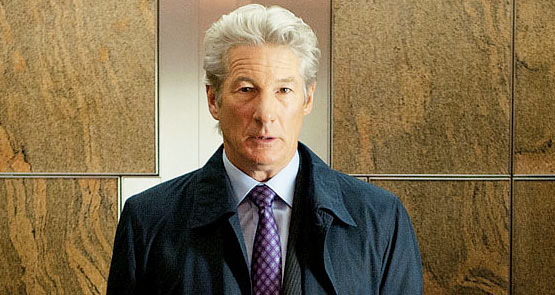
 Richard Gere and suits are like human bodies and skin: simply matter-of-course, the natural order of things — an oyster in a shell, a nail on a finger, a neurotic protagonist in a Woody Allen film. That angular teddy bear face, tight but slightly droopy with age, those cooly focused eyes, the slick silver bob that sits on top…
Richard Gere and suits are like human bodies and skin: simply matter-of-course, the natural order of things — an oyster in a shell, a nail on a finger, a neurotic protagonist in a Woody Allen film. That angular teddy bear face, tight but slightly droopy with age, those cooly focused eyes, the slick silver bob that sits on top…
Gere has the look and swag of a hotshot lawyer or a high flying advertising executive right out of central casting. The persuasive demeanour of a man cognitively distant from the moral implications of his actions; aware but aloof, serious but charming, with an agenda bubbling beneath the bedroom smiles and silky exterior. This is Gere when he’s typecast. And Gere when he’s good.
In writer/director Nicholas Jarecki’s steely corporate drama/thriller Arbitrage, the under-rated and under-used 63-year-old is perfectly cast as Robert Miller, a hedge-fund wheeler ‘n’ dealer whose life at the outset seems all cigars, champagne and caviar. But of course it isn’t.
Miller is having relationship troubles — more with his art-dealer mistress (Laetetia Casta) than his wife (Susan Sarandon) — and a titanic deal on which everything is riding, the sale of his trading company to a bank, appears to be on shaky ground. Multiple plotlines scuttle into a tangled-web-we-weave personal apocalypse when a horrible accident leads Miller to an impromptu decision that bears a potentially long-lasting impact on his life, the lives of those around him and ‘the big sale’.
Jarecki’s screenplay tangles circumstantial crime with personal and financial liability for a post-GFC business atmospheria: markets are volatile, fear and loathing abound. The protection of one person or institution’s wealth and security is spun, with a degree of truth, as a goose-for-the-gander numbers game. Arbitrage both personalises and impersonalises the fallout; it’s about Miller but it’s also about an indeterminable ‘them’ — the stakeholders and hangers-on, the parties with vested interests. Personal and professional is meshed to the point at which individual responsibility appears not so much an after thought as, absurdly, an impossibility.
Richard Gere maintains a down-the-nose superiority required to make the role work and, crucially, is smarmy and endearing, condemnable and personable. That’s a Clooney-esque achievement, or Michael Douglas when he’s in form — not something any Johnny-come-lately can muster.
Gere must know this is where his strengths lie but isn’t content with simply rehashing the shiny-toothed, morally murky professional shtick, put to such good use here and in Primal Fear (1996). He too often bounces into the cheque book safety net of grown-up chick flick fodder, where the work is stable but the scripts haven’t got his back: your Runaway Bride (1998), Autumn in New York (2000), Dr T and the Women (2000), Shall We Dance (2004), etc.
In Arbitage, Gere’s style rubs off with the grease of a slick attorney, but the beauty of his performance lies in how he chips away at Miller’s facile exterior, whittles an iron-fisted boardroom facade into something that increasingly resembles a husk of a person, as if Hollywood itself has been banging on his door, asking for a confession.
Arbitrage’s Australian theatrical release date: September 27, 2012.







Crikey is committed to hosting lively discussions. Help us keep the conversation useful, interesting and welcoming. We aim to publish comments quickly in the interest of promoting robust conversation, but we’re a small team and we deploy filters to protect against legal risk. Occasionally your comment may be held up while we review, but we’re working as fast as we can to keep the conversation rolling.
The Crikey comment section is members-only content. Please subscribe to leave a comment.
The Crikey comment section is members-only content. Please login to leave a comment.